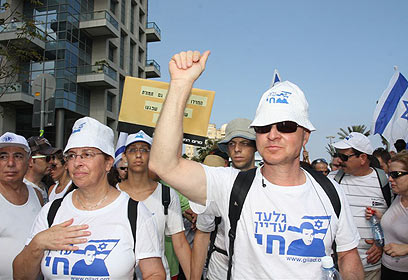

As the prime minister makes his way to Washington, the Shalit family and their supporters are continuing on their protest march for the release of captive Israeli soldier Gilad Shalit.
Already at 7:30 am on Tuesday, some 1,500 activists gathered at the onramp to the southbound side of Ayalon Highway. When they reached Route 1, their numbers already reached some 4,000 people. Traffic in the area is slow.
The participants reached Beit Dagan, where they will hold a rally at the town's public library. From Beit Dagan, they will leave for Ramla at around 4 pm. Another rally will be held in Ramla's Gan Hanassi. The captive family's soldier will then spend the night in Kibbutz Givat Brenner.

Noam and Aviva Shalit marching through Tel Aviv (Photo: Ofer Amram)
Joining Tuesday's section of the march are about 100 hearing-impaired and deaf people from The Institute for the Advancement of Deaf Peoples in Israel. During the event at Beit Dagan, pieces written by children about Gilad will be read aloud and translated into sign language.
"It is important for us to show that the deaf and hearing-impaired community is taking an active role in the struggle," said Yael Kakun, executive director of the institute.
"You always hear about them when speaking about rights, about the difficulties of integrating into society. But this time we are mobilizing for a joint cause that unifies everyone, deaf and hearing people as one. Our participation in this journey is not a political statement, but support in the face of the Shalit family's pain."
During the slew of events held Monday in Tel Aviv, Roi Amitai, who was in the tank with Gilad Shalit when he was captured, spoke to Ynet in a rare conversation with the press.
Ever since that day, Amitai has refused to be interviewed. "I don't want it to fall on my shoulders," he explained on Monday. However, during the march, he agreed to share his sentiments. "It hurts, but it doesn't have a limit. I don't work with a 'pain speedometer.' As time goes on, it hurts. It's hard."
"There were reporters who said to me, listen, if you don't get up and do something right now, not only are you not contributing, it is damaging, destructive. Who are you to say this to me? I care, and it's hard for me to see these things, that four years have passed and people are pushing it aside, not doing anything. But I don’t want to put all this on my shoulders," he said.
- Follow Ynetnews on Facebook















